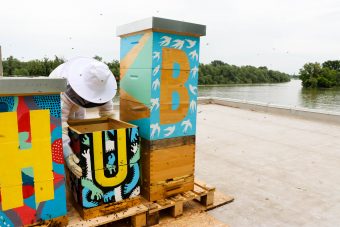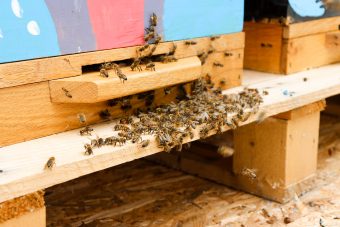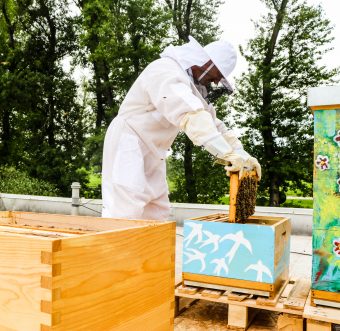Would you believe us if we revealed to you that one Belgrade-based marketing agency with around 40 employees during just one day in April expanded its working capacity with 72,000 new members spread across five offices? If we told you as well, that their new workers are potentially smaller than the nail on the thumb of your hand, would you perhaps assume that they are – bees?

Following the recent discoveries of the Japanese, the team of “Kreativa Unlimited” agency found themselves at the Sava estuary. Scientists from the land of the rising sun detected that the stay in nature doubles the level of one’s creativity. And what is more important to people who made a promise to their clients about having an inexhaustible source of interesting ideas than the eternal inspiration? For this very reason, “Kreativa Unlimited” moved to a raft across the Great War Island eight years ago.
In order to repay nature for its contribution in making successful collaborations for many years, this marketing agency decided to put some hives on the roof of its object. The employees of the company thus joined the Bundestag MPs, City Hall of Copenhagen officials, Paris Opera performers and Astoria Hotel managers in New York who had already become “urban beekeepers” a few years ago. They also planted a garden on the terrace – the fruits produced there feed both them and the bees.
“We are proud to be the first Serbian company that is engaged in urban beekeeping, and we hope to get competition very soon. It is important that we made the first step, so Belgrade is now listed on the map of European cities on whose roofs bees live and work”, says Stevisa Vujasinovic, PR manager of “Save the Bees” project.Urban beekeeping represents a practice of keeping bee colonies in cities and, according to our interlocutor, is a growing trend worldwide. By following it, you will be helping honeybees that are also affected by climate change, in addition to other disasters.
If you do not see yourself as a bee savior, then save yourself. Keep in mind the immense benefit of these valuable insects for the human diet. They pollinate inter alia around 200 crops, and it is estimated that, due to their extinction, as many as 100,000 plants would disappear from the face of the earth. The population of bees has been declining uncontrollably in recent years. “Their endangerment is a global phenomenon,” Stevisa emphasizes, adding that in some parts of the United States they have already been declared an endangered species. Due to the severity of the problem, the Chinese are forced to pollinate with specially designed tools, but it seems impossible to replace the bees in a makeshift manner.
Given the fact that it has the biggest number of hives per capita, Serbia doesn’t feel the devastation of the crisis to the same extent as other countries, but the recent bee deaths in Vojvodina have concerned the public.
The importance of their cultivation in urban areas is manifold both from the perspective of ecology and from the point of view of economics.

Beekeepers are claiming that the population of city apiaries is healthier and more productive than their relatives from the village and that it gives a huge contribution to the local biodiversity. Although urban beekeeping is most often a hobby and not the primary source of finance for a house-hold, the experts are emphasizing that a family of four could support itself by taking care of around fifty beehives.
Honey is a superfood. Thanks to a high content of simple sugars, vitamins and minerals, it is easily digestible and, after getting in the body, it goes directly to the blood-stream. Listing its positive characteristics, no matter how long it goes, will always end in et cetera. “Honey regenerates tissue, eliminates pain, improves heart function, increases resistance, has a calming effect on the nervous system, regulates blood pressure, reduces elderly weakness, strengthens mental abilities, et cetera,” Stevisa notes and announces the possibility of branding “Kreativa Unlimited” honey from next year.

It shouldn’t be overlooked that the joint cooperation and diligence of bees and beekeepers is also resulting in royal jelly, propolis, wax and bee venom.
Ecology is one of the aspects of corporate social responsibility, so we took the opportunity to ask Stevisa whether clients of his marketing agency recognize the need to take part in improving the quality of their environment. “One of the companies that have hired us focuses on the specific goal of sustainable development every year, and it implements projects tailored to local needs in different countries. Last year we worked on Belgrade sparrows’ protection. Since the company in question is a manufacturer of alcoholic beverages, this year we collected bottles thrown from cafes and clubs and made sculptures from them,” he replies.
Activities in the field of bee conservation “Kreativa Unlimited” implemented in cooperation with the creative hub “Nova Iskra” and the environmental organization “Ekonaut” within the project “BeeConnected”. This project is based on renting and maintenance of hives for socially responsible companies and individuals who have a desire to have an apiary in their space.
Prepared by: Jelena Kozbasic
This article was published in the new issue of Energy portal Magazine CLIMATE CHANGE, September – November 2019.

